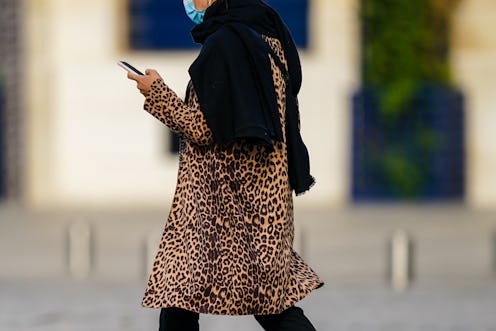Life
What To Say To Someone Who Refuses To Wear A Face Mask

Wearing a face mask is a vital way to protect yourself from COVID-19, whether you're taking part in protests or going to the grocery store. "Now that the U.S. is reopening, wearing masks is an even more important tool for reducing transmission," Dr. Larry Burchett M.D., an emergency physician, tells Bustle. If there are people in your life who refuse to wear a face mask, though, it can be difficult to know how to convince them to do so.
"Wearing a mask when around others is one of the most important things people can do, not only to protect themselves, but to protect others," Dr. Robert Quigley M.D., senior vice president and regional medical director of medical and security services company International SOS, tells Bustle. A lot of people who have coronavirus don't know it, he says. "By wearing a mask, you are reducing the probability of transmitting infected particles — that you may not know you are carrying — to other people and surfaces."
If you know people who point-blank refuse to wear masks, or don't understand why it's such a big deal, you might be tempted to start an argument — but an empathetic conversation is more likely to get you somewhere, Joshua Klapow Ph.D., a clinical psychologist, tells Bustle. For one thing, you might not know why they're not wearing a mask. "Not wearing a mask could be driven by anything from political ideology, to belief that masks aren’t effective, to statements about personal rights and the government’s power, to forgetfulness, to medical or psychological reasons like anxiety," he says.
It's important not to make assumptions about the person's motivations, either. "Nobody wants to give coronavirus to someone else and have them potentially die," Dr. Burchett tells Bustle. But they may not realize why masks are so essential for preventing the spread of coronavirus, particularly when you're indoors or in close proximity with others.
Once you know their reasons for not wearing a mask, you can begin to approach their concerns from a place of information and empathy. "The best you can do is provide information and a personal request," Klapow says. "Do not assume that you will convince them to make a change." Avoid yelling, arguing, or lecturing, which can make people defensive.
There are certain arguments that may be powerful to people who don't want to wear masks. "Try to appeal to the greater purpose of wearing the mask," says Klapow. Talk about protecting others and those around them. Mentioning their personal social sphere, like relatives who might be at risk, might also strike a chord; humans are evolutionarily programmed to care for those closest to us.
And if all else fails, you can draw a line. "At some point you may find yourself laying down some boundaries," Klapow says. "It’s OK to let a person know that if they refuse to wear a mask you can’t interact with them." It's also OK to walk away from an interaction with somebody because they aren't wearing a mask, or to insist that they remain six feet away from you.
In the end, experts say, wearing a face mask remains one of the best ways to beat the spread of coronavirus. And protecting yourself and those you love comes first, even if it means some uncomfortable conversations.
Experts:
Dr. Larry Burchett M.D.
Joshua Klapow Ph.D.
Dr. Robert Quigley M.D.